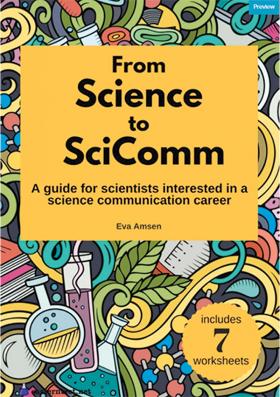Five Tips for Communicating Science Like a Pro
Spring
2018
Special Feature
Five Tips for Communicating Science Like a Pro
Rachel Kaufman, Editor
 Whether you have your heart set on research, teaching, or another career after you graduate, every physicist needs to know how to communicate. Some physicists will even leave the lab entirely and instead spend their careers communicating science to others, whether as a writer, a lecturer, or something else.
Whether you have your heart set on research, teaching, or another career after you graduate, every physicist needs to know how to communicate. Some physicists will even leave the lab entirely and instead spend their careers communicating science to others, whether as a writer, a lecturer, or something else.
Wherever your career takes you, communication skills will be crucial to your success as a professional. That’s why SPS Observer reached out to Eva Amsen.
Amsen has a PhD in biochemistry but has spent her career outside of the traditional lab environment. She has worked for scientific publishers and as a freelance science journalist, and has managed communications for scientific organizations, among other jobs. At her blog, easternblot.net, she laid out a series of posts aimed at helping scientists—physicists included, of course—who want to improve their communication skills or pursue a job in science communication. She recently compiled those posts into an ebook (http://easternblot.net/2018/01/16/science-scicomm-workbook/) featuring a set of seven exercises that are meant to help you map out your career in science communication.
Observer sat down with Amsen to learn how scientists can improve their communication skills, or even transition to a science communication career.
Here’s what we learned:
1. Know your “scicomm style.” Are you interested in writing articles for the public? Interpreting exhibits at a science museum? Giving demos at an outreach event? These are all examples of science communication. What kind interests you the most? “It took me years to figure out my own style,” Amsen says. If you’re in the same boat, spend some time reflecting on what kind of communication you see yourself doing, and try lots of different things to see what you like best.
2. Read what you want to write. “I was a teaching assistant for a science writing course just after my PhD. The undergraduates in the course were writing essays that were supposed to be really general audience pieces, and they were writing these convoluted sentence structures that you'd only find in scientific papers. It's because that's what they’d been reading—you kind of absorb that language.”
Instead, make sure you’re absorbing more than academic language if you want to work outside academia. If you want to work in science journalism, read great science journalism. If you want to work in university communications—you can usually sign up to get your university’s press releases to start to get a sense of what a press release sounds like. As a bonus, doing this will help you stay up to date on the exciting research happening at your school. Want to write science books for kids? Read as many as you can.
3. Make connections. As a scientist, it’s important to meet other researchers in your field—they might become mentors or collaborators. As a science communicator, the same is true. Meet and talk with other writers or people who do work similar to the work you want to do. “It’s a very welcoming community,” Amsen says. “You get to find what jobs are out there, and maybe make some connections.”
4. Just do it. You don’t need a license or degree to start writing or speaking about science (although the degree does help if and when you want to start getting paid for your work). You can get valuable experience while still working on your degree. If your school has a student newspaper, write a science column for it.
“When I was doing my PhD, the editors of the university newspaper were not science students themselves, so they always needed people to write about science.” Amsen adds. (And if you’re an SPS member, get in touch with us about contributing to our pages!)
If you’d prefer to speak or give demos rather than write, look for events near you where scientists present their work to the public (some events with chapters around the country include Nerd Nite and Science Café, among others), find a local museum to volunteer at, or just get active with your SPS chapter’s outreach events.
5. Track it. While you’re “just doing it,” keep track of how much time projects take. Unless and until you’re getting paid for your outreach and communications work, it’s important to know whether you’re spending your time wisely—or getting sucked into a never-ending project. “I used to have a really bad habit of agreeing to do things that ended up taking way too much time, because I couldn't judge how long something would take,” Amsen says. “[Time management] isn't generally taught as something you should be doing.” If you do start to get paid for your work, knowing how long something takes will help you figure out how much to charge.
Science communication is a wide-open field with many possible specialties. Hopefully you will be inspired by the many options available to you in science communication. Best of luck on your career journey! //
